|
|
|
Sort Order |
|
|
|
Items / Page
|
|
|
|
|
|
|
| Srl | Item |
| 1 |
ID:
141278
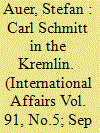

|
|
|
|
|
| Summary/Abstract |
The protracted crisis in Ukraine has exposed fundamental political differences between leaders in western Europe and their counterparts in Russia. The very existence of the European Union was meant to have refuted geopolitics as a useful theoretical lens through which to view power relations in Europe. After all, the European project is based on the idea that boundaries no longer matter and that national sovereignty is obsolete. And yet, geopolitics remains critically important—certainly for Europe's potential enemies, but also for Europe itself. It is poignant that to advance our understanding of this new constellation we are well served to turn to the insights of a classic, if hugely controversial, German political thinker: Carl Schmitt. Schmitt's political philosophy is relevant in three aspects. First, as a source of inspiration—even if only indirectly—for the contemporary Russian political establishment. Second, the behaviour of Putin's Russia, particularly since 2008, can be best understood through some of the key concepts that preoccupied Schmitt: sovereignty, the political and geopolitics. Third, Schmitt's philosophy can serve as a point of departure for reflecting on the possibility of a more robust response by Europe to the Russian intervention in Ukraine. What Europe needs is a more hard-nosed realist approach, which recognizes that Russia's expansionist ambitions can only be constrained by its own readiness and willingness to deploy power both politically and, if necessary, even militarily.
|
|
|
|
|
|
|
|
|
|
|
|
|
|
|
|
| 2 |
ID:
130834
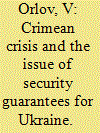

|
|
|
|
|
| Publication |
2014.
|
| Summary/Abstract |
The author offers opinions on the Budapest Memorandum, a 1994 agreement between Russia, Ukraine, Great Britain and the U.S. offering security guarantees for Ukraine in return for its nuclear disarmament. Citing the history of Ukraine's foreign relations since 1991, It is stated that since the U.S. and Great Britain have recognized the provision government created in 2014 while Russia has not, the Memorandum has no relevance to Russia's intervention in Crimea.
|
|
|
|
|
|
|
|
|
|
|
|
|
|
|
|
| 3 |
ID:
130838
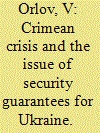

|
|
|
|
|
| Publication |
2014.
|
| Summary/Abstract |
The author offers opinions on the Budapest Memorandum, a 1994 agreement between Russia, Ukraine, Great Britain and the U.S. offering security guarantees for Ukraine in return for its nuclear disarmament. Citing the history of Ukraine's foreign relations since 1991, It is stated that since the U.S. and Great Britain have recognized the provision government created in 2014 while Russia has not, the Memorandum has no relevance to Russia's intervention in Crimea.
|
|
|
|
|
|
|
|
|
|
|
|
|
|
|
|
| 4 |
ID:
139326
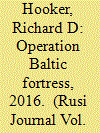

|
|
|
|
|
| Summary/Abstract |
The Russian intervention in Ukraine can be seen not as an isolated incident, but as part of a larger strategy aimed at re-establishing Russian control and influence over its near abroad – a sphere of influence severely diminished with the fall of the Berlin Wall. Building on its success in Georgia, the Russian Federation moved aggressively in 2014 to seize Crimea and destabilise eastern Ukraine. In each case, Russia leveraged ethnic Russian populations to encourage separatist movements, introducing Russian paramilitaries, intelligence operatives, special forces and eventually conventional forces. In this hypothetical scenario, written as a ‘historical perspective’, Richard D Hooker, Jr examines a possible next move against the Baltic States, where similar conditions apply. Should Russia move against the Baltics, NATO will face its most challenging test in a generation.
|
|
|
|
|
|
|
|
|
|
|
|
|
|
|
|
| 5 |
ID:
137830
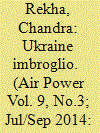

|
|
|
|
|
| Summary/Abstract |
The recent developments in Ukraine have once again brought the region to a critical juncture in international affairs. What started as anti-government protests soon transformed into intense ethno-political mobilisation with the demand for secession becoming contagious in eastern Ukraine. While analysts are busy examining the triggers for the intense protests, the need of the hour is to evaluate the failure of Kiev to address the underlying factors that have fostered the uprising of ethnic groups in Ukraine since its independence post Soviet disintegration in 1991.
|
|
|
|
|
|
|
|
|
|
|
|
|
|
|
|
|
|
|
|
|